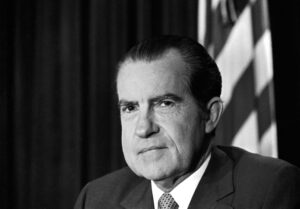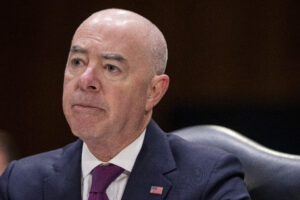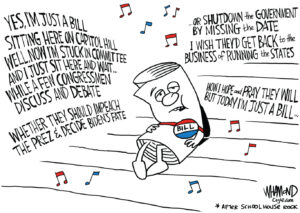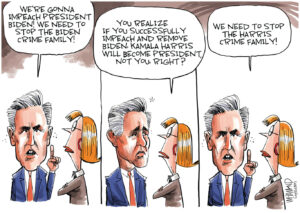Podcast: Elizabeth de la Vega and the Case for Impeachment
Regular panelists Robert Scheer, James Harris and Joshua Scheer are joined by special guest Elizabeth de la Vega, a federal prosecutor with more than 20 years of experience and author of the book "United States v. George W. Bush et al.," which lays out the case against the president. UPDATE: Full transcript available
Regular panelists Robert Scheer, James Harris and Joshua Scheer are joined by special guest Elizabeth de la Vega, a federal prosecutor with more than 20 years of experience and author of the book “United States v. George W. Bush et al.,” which lays out the case against the president.
Listen:
(running time: 29:08 / 26.7 MB)
Subscribe to the podcast:
Full Transcript:
Intro: You are listening to original audio by truthdig.com. For more information resources, visit us on the Web at www.truthdig.com.
James Harris: In the worst display of media coverage I’ve seen in a long while, news stations and papers buried us this week with ridiculous, inconsequential headlines. Let’s take a look at this week’s news: Remember the diaper-wearing astronaut set out to kill her lover’s lover? Ted Haggard is now cured of homosexuality. Nancy Pelosi wants a bigger airplane for her staff. Anna Nicole Smith, the former Playboy bunny — she’s now deceased. Meanwhile, under the things that matter: The 2008 budget. Bush proposed that more than 25 percent of that be spent on the war on terror. Military officials are calling for increased civilian involvement. The Pentagon is investigating again the botched attempts to draw links between Saddam and al-Qaida. Not to mention 70 percent of Americans want out of Iraq and the Iranian leader has said to us, point blank, if you come in here you’re gonna get hurt. So there will be no discussion today of Anna Nicole or Ted Haggard’s magical conversion. Today we’re drilling beneath the headlines. This is Truthdig. Let’s meet our panel. Here with Mr. Josh Scheer, the surefire Truthdig contributor. If you haven’t had a chance, be sure to listen to his Stanley Sheinbaum interview, which has received rave reviews. Mr. Robert Scheer is also here, author of “Playing President” and has written a scathing criticism of the Bush budget proposal currently on Truthdig. Be sure to read all of those articles. We have the distinct pleasure of welcoming former federal prosecutor Elizabeth de la Vega, who is the author of the new title the “United States v. George Bush et al.” Let’s start with your book, Ms. de la Vega.
Elizabeth de la Vega: Yes.
Harris: Can you give us a bit of back story on your text? Why did you decide to write this book?
De la Vega: Sure. I was a prosecutor for over 20 years and I took early retirement in the fall of 2004. And at that point I really had time to look more carefully at how it was that the president and his senior advisers were able to deceive the public about the war. And, I was in-, particular interested in comparing what information was available to the administration behind the scenes versus what they said publicly and how it was that none of this is really covered in the press. So what I set about to do was lay it all out as if it were an actual criminal case, and I analyzed it the same way I would analyze any criminal case. And what I found was something we, many of us, already know intuitively and on varying levels with varying degrees of specificity, but it was clear to me after comparing in detail all the behind-the-scenes evidence to what was said publicly that this was a more massive fraud than the fraud committed by the Enron folks, about which everybody was completely outraged and rightly so. And so I laid it out as if it were an actual criminal case. The only thing that’s fictional about the book is the fact that there is not as yet any such proceeding. But beyond that all of it is absolutely true. And I think it’s critical for us to not look away from this fraud, because in large part it continues. And I don’t think we’re ever going to get out of Iraq without, at least, first determining what the truth is about how we ended up there and the fraud that keeps us there.
Harris: Well, I came to know about your book because of the excellent work they did in interviewing you over at BuzzFlash.com. We would love to advertise your book on our website and perhaps even share some of the text. Give me some of the details. Where can people find your book?
De la Vega: It’s called the “United States v. George W. Bush et al.” And if you go to www.sevenstories.com and just scroll down you’ll come to the blurb about my book. In addition actually I give a talk about the book that is going to be on C-SPAN tomorrow and the next day, hosted by Garrison Keillor. So that should be interesting. That will be — if you go to the C-SPAN website you can find that as well.
Harris: Well, thank you for that.
De la Vega: Sure.
Harris: About your book, now how has it been received? Obviously there’s something fishy going on in the Bush administration. Being a former federal prosecutor, have you been praised for your work or have you found that most government officials don’t like what you’re saying?
De la Vega: Well, the response has been almost overwhelmingly positive. But I can’t say what people who haven’t responded are thinking privately. But I can tell you that most of my colleagues, including ones who are still federal prosecutors and some who are not, have been for many years completely distressed by the actions of the Bush administration in taking away people’s civil liberties and not applying the rule of law, one of the bedrock principles of our country, of course. And one prosecutor’s stand is that no person is above the law and it’s equally important that people be treated the same regardless of whether they’re the most humble of our citizens or the most powerful. So the response has been very, very good, actually. But I think people are hungry really to talk about these issues and try to figure out something to do about it.
Harris: I mean he’s sending in more troops, spending more money, do you really think he’s not above the law?
De la Vega: Well, he’s clearly not above the law in any constitutional or criminal law, a sense of criminal law. The problem is that we don’t have a Congress as yet that is really holding him to task. It is obviously their responsibility to conduct oversight of the president and they’re kind of easing into it, as far as I can tell. But I think the actions of the Bush administration have shown that it’s far past the time that we should be easing into anything. They have demonstrated that they are in blatant disregard of the law time and time again. And now we have the majority of the public, the vast majority, that does not want to have an escalation of the war, and he is defiantly going along his merry way, if you can use that term. So I, I think we are really in a crisis right now and it’s, it’s really time for Congress see it serious finally.
Josh Scheer: Hi, Elizabeth, this is Josh. I just have a quick question.
De la Vega: Hi, Josh.
Josh Scheer: With the Attorney General Gonzales being the top cop, I mean isn’t the president kind of above the law? I mean this attorney general’s kind of protected him at all costs, putting in Bush friends, putting in Bush family. Do you think as a federal prosecutor that the attorney general should not be an appointed position like they are in some states?
De la Vega: I think that’s really the least of our problems right now. I think what we need to have is Congress … I, the model that I think is most effective for what’s going on right now would be the Watergate model. And we really do need Congress to conduct the same kind of hearings that they conducted like by Sam Ervin, the country lawyer, and get the truth out or as you folks would say, dig the truth out. And those hearings were through articles of impeachment and the appointment of a special prosecutor. Now we have a different provision for that, but I think it’s going to take something along those lines.
Robert Scheer: Hi, it’s Bob.
De la Vega: Hi, Bob.
Robert Scheer: You know, as you know, John Dean wrote a book called “Worse Than Watergate” …. And he was, I guess, the key witness in the Watergate hearings. And … that probably would have been dismissed had there, [had] existence of the tapes not surfaced.
Alexander Butterfield testified and suddenly what Dean had said about there being a cancer on the presidency was, turned out to be something he had actually said to Nixon, and then Dean emerges as I think one of the most heroic figures in the last half-century.
But it was interesting, he was very early on with this critique of the Bush administration. He said he’d never … you know, and he’s been a pretty good student of the presidency…. [He has written] a book about [President] Harding and others. And he said this [scandal] is worse.
De la Vega: It is.
Robert Scheer: And maybe we should talk a little bit about it because some, there’s sort of a tendency, even in the media to say, well, presidents lie and they lie about national security, they lie about war, what else is new?
And so forth. And here we have, right now we have two cases that have sort of a legal connection. One is the Libby trial … in which chief of staff for the vice president has been, I think — I always believe in innocent till proven guilty — but is a pretty damning case… that he distorted. And if he distorted, then his boss seemed to have inspired it.
And so it goes high there. And the other assistant inspector general report that James referred to where under pressure from the Senate Intelligence Committee, which had not done its second report yet, and as long as the Republicans were in charge they might never have done it. But now with Sen. Levin they’re pushing ahead on not only where did we go wrong but who are the people responsible in the administration for getting this point? And I think this report, while it says they didn’t come up with what, the inspector general didn’t come up with criminal liability, he said, you know, they just totally distorted the whole intelligence process and cooked the books and cherry-picked the data. And I just wonder at what point does this become actionable? Deceiving the public consciously about information that would lead you to war?
De la Vega: Well, I actually think it’s been actionable all along. We’re in this strange suspension of reality I think that we’ve been in for several years. Because the reason I wrote the book was because it was very obvious to me, and I think it’s obvious to you, because you wrote a book about it too, but that we had more than enough information a couple of years ago to know that the Bush administration not only manipulated the underlying intelligence to make it look better, but they used the information they had in a way that was deceitful by leaving off half of it or artfully wording their statements in a way that would be deceptive to people, or they simply just made reckless statements without any regard for whether they were true, truthful or not. And those are the very essence of fraud. That’s how people defraud people in any realm, whether it’s investments or contracts or anything. So, I don’t know, the tipping point ultimately is a political question, which is the problem that we have right now. Because I think well over half the people in the country already believe, already know, that we were deceived about this war. So it’s been actionable in a legal sense. The information has been there for a couple of years. And, and these things that come out, these new reports, really they’re just additional conclusions about the same facts that we’ve known all along. And that’s why I wrote the book. I wanted people to be able to look at those facts themselves and they can decide for themselves. And I think the conclusion is pretty much inevitable.
Josh Scheer: And now, Elizabeth, this is Josh again..
Now the book is written as a, I mean you actually put in the grand jury’s eyes and you have it as a grand jury and you have them getting coffee breaks and all that. So… it’s not a legal scholar writing this book. I mean why is that, did you do that intentionally?
De la Vega: Yes. Which is not to say I’m not a legal scholar but, I mean I am a lawyer. But I, I, it’s not written in a scholarly way. I wanted it to be very accessible to anybody who was interested in it. And so the, as you are aware then as the explanation of the law is very down to earth, because fraud really is a very common-sense kind of down-to-earth thing, and I wanted people to understand that and I wanted people to understand that it’s much more than just lying, because lying is actually a very bad way to trick people, because it’s very easy to get caught. It’s usually done in a more artful way. I also put it in the grand jury format because I wanted people to see that in our system of government it’s still the people who judge the actions of others when circumstances warrant it in a legal sense. And so it’s just everyday people, and everyday people have the same right to, to judge the president as they do to judge anybody who comes before the court. On the one hand this fraud is really a very everyday kind of thing except that its scope and its consequences are horrific. And so therefore knowing that we’ve had this horrible fraud, it seems to me that we have no choice but to take some action. And the question is what that action is. And I think that’s where we have to come back to Congress.
Harris: I get what you’re saying very easily. I think the average American’s going to get what you’re saying very easily. Let’s be imaginative for a moment. Tell me, what is it going to take from the American public to mount an actionable case against the president and against his cronies?
De la Vega: Well, that’s where I, I don’t have all the answers. My, my expertise is in the criminal law and I, my purpose is really to educate people and to hopefully spur them to action. But, you know in our system of government we do have the three branches but actually the fourth branch is comprised of the citizens. And thus far we are stuck in a situation, I believe, where Congress is way behind the citizens in its thinking. And they are continuing to make political quote/unquote or strategic decisions about something that is far too serious to be the subject of strategizing. And, you know they wouldn’t strategize about whether to call 911 if a crime were happening right in front of their eyes. Well, this is a crime happening in front of their eyes, and I think it’s gonna take the citizenry to move Congress to do the right thing.
Robert Scheer: You know I’m sort of mystified by something. Ah, you know Clinton was impeached.
De la Vega: Right.
Robert Scheer: And ah, I argue with my friends all the time about how important was it and, you know, some say it was very important and, perjury and so forth, and I say what was not. In fact, ironically, his having to testify in the Paula Jones case involved taking him away on a day that he was responding to al-Qaida and launching cruise missiles. It’s a matter we accepted that this, the public rejected it at the end of the day…. And [Clinton’s] popularity was high. But we sort of look back on it as sort of a normal thing.
Clinton was impeached.
De la Vega: Right.
Robert Scheer: Yet when you suggest impeaching Bush people look at you like you lost your marbles, or it’s a far-out idea. And how do these crimes that you’ve suggested that Bush might have committed compare to Clinton’s? I know this sounds like a softball question, but I don’t intend it that way. I mean I just, most of us are unfamiliar with the terms of law and what’s involved here and so maybe you can educate us on this.
De la Vega: Well, it’s really an important question because the perjury that was committed by President Clinton, one instance was in a civil deposition, the other was in the grand jury. But in each case it was, the subject involved was a very private matter really between two people, and if people had the inclination to look at the U.S. attorney’s manual they would find that one of the pieces of advice, more than advice actually, kind of a consideration that one is supposed to take into account, is the nature of the perjury, the nature of the topic about which somebody lies. So in a case like this, the advice would be not to prosecute it because [in the law it would be called] de minimis — in other words, minimal, really. So yes, it was illegal to commit perjury and that is serious, but it was not something that would be prosecuted. But more than that it’s nothing that goes to the governance of the country. So it’s not an impeachable offense. Because a high crime/ misdemeanor has to be something that goes to abuse of power, the abuse of the executive position and in the context of governing, not, not in the context of a private matter.
Robert Scheer: I wonder if I could just stop you there because I reread the Constitution the other night….
De la Vega: You did? You carry it around with you?
Robert Scheer: Yeah. And I, that’s a strange, the words you’re referring to for those who don’t know, the two people listening who might not know it, high crimes/misdemeanor is confusing. What does that mean? How did it get into the Constitution and how do you as a lawyer think about it?
De la Vega: Oh, well, I’m not sure I’m the best person to ask the whole history of it. I don’t think I can tell you that. But I do think that the legal definition is that it has to be something that has, that goes to the heart of the checks and balances that we have in the system of government and it has to go to an abuse of the executive power in the context of governing the country. You know, I think an argument could be made that President Clinton abused his power vis–vis Monica Lewinsky, but that’s a whole different thing.
Robert Scheer: Again, let me just interrupt for those who…
De la Vega: Sure.
Robert Scheer: …don’t recall their civics class. Ah, I do think the issue, when it’s put that way in terms of the division of power and the responsibilities of the president, vis–vis Congress in particular and then the court. Um, lying about going to war, which, after all, declaring war is a power reserved to Congress…
De la Vega: Right.
Robert Scheer: …not to the president. You know, we have to think about that in a different way is I guess is what you’re saying.
De la Vega: Yes.
Robert Scheer: And then, then lying about Paula Jones.
De la Vega: Oh, absolutely. And the statute that I use as the basis for the grand jury presentation is conspiracy to defraud the United States. Now that’s a statute that’s been around for a couple of hundred years. And in the context of this type of situation, what it means is disagreeing really, it doesn’t mean it’s sinister, you know, spooky kind of thing; it’s just concerted action to use to seat in some way to interfere with a branch or agency of government. And it was used to prosecute H.R. Haldeman of Watergate fame, who was involved in the coverup and he interfered … it can be a branch or agency. So he interfered with the FBI and CIA’s investigation of the Watergate burglary…. So it’s not something that is a far-fetched application of the statute. And in this context as I lay out in the book the administration through the voices of Karl Rove and Andy Carr in early September of 2002, and your listeners will probably recall that the authorization to use military force was Oct. 11, 2002. Well, they said about September 6th and they said, we are now starting our essentially marketing program to sell this war and we are doing it through the public in order to influence the public and Congress because we want this authorization in five to six weeks. And Karl Rove said in the end it will be difficult for anyone in Congress to vote against it. Now that is a clear expression of intent to influence Congress through their public statement. So if they had told the truth of course there would be no fraud, but so many of us know they either deceived or omitted information or misrepresented information in almost every area having to do with the grounds for the war, whether they decided to go to war, whether Iraq was more or less of a threat than North Korea and Iran, and of course then about details, too, about weapons of mass destruction. So it was a massive orchestrated campaign, and obviously that is far, far, far more serious than what happened with Clinton. And the unfortunate thing is not only did the Republicans abuse impeachment, the impeachment process with Clinton, it’s led to this strange aversion to what is supposed to be the remedy for abuse of power. So it’s kind of a double whammy. The Republicans abused it and now the Democrats are afraid of actually implementing what, implementing it when it’s required.
Harris: You remind me a lot of myself because I’m an idealist, and in a perfect world I think people get up and protest and fight this and…
De la Vega: Right.
Harris: …do exactly as you had suggested that they do. The pragmatic part of me says we’re all lazy. And judging on the headlines that I saw this week, you know from the astronaut to Haggard being mysteriously cured of homosexuality, do you think, and I’d like to hear what all of you think, do you think the media is doing their part? Because I think it is the media that mobilizes us, that gets us involved in cases like this, and I don’t think they’re doing what they need to do to make dreams like yours come true. Because in order to impeach the president, this will need to become a national issue and an everyday issue. I’d like to hear your thoughts, Bob, Josh and Elizabeth. How do we mobilize the media if they’re not even doing their homework?
Robert Scheer: This is Bob. I could dump on the media as readily as anyone. Ah, and obviously they fall for everything that might drive circulation. They trivialize issues. The Washington media has basically been in the hip pocket of the admin … any administration. They’re more interested in their career than they are in serving the public. I mean all that’s clear. But I would toss the question around, where’s everyone else? You know? Where is the legal community? Where are all these people who know the law? Now you know what’s great, the reason we’re doing this interview here is we have a prosecutor who has stepped up to the plate and said wait a minute, you know, let’s do something here. You know I teach at USC. I teach at a college that has a big law school. I have a lot of friends over at Berkeley and UCLA and other law schools. Where are they? We know that the, on the side of torture and the side of violating the Constitution we’ve had some lawyers step up who support the Bush administration, some who are in the administration. But I would put it back to you, where, where’s, where are your colleagues on all this?
Harris: Elizabeth, I think he’s talking to you. He can’t be talking to me.
Robert Scheer: No, I’m not talking to you, James.
De la Vega: Well, I actually, I don’t know. In a way you kind of just circle back to the media because I know online, for example, I have seen a letter or a petition signed by a hundred different legal groups — I think that’s correct. But I’ve never seen that in the mainstream media. And … pardon me?
Robert Scheer: I mean can you get that to us? We’ll post it right today, I mean, yeah.
De la Vega: I don’t know where everybody is. I wish I could answer that. But I do know that I’ve been traveling around the country a little bit lately and I think that people are really rearing to go. And nobody, nobody knows what to do.
Robert Scheer: Are you getting much exposure? Are you getting on any of these talk shows and….
De la Vega: No national talk shows. I was on “The Colbert Report.”
Robert Scheer: How’d you do there? I missed that. I usually watch it every night.
De la Vega: Oh, well, I’ll send you the link.
Robert Scheer: Did you do all right?
De la Vega: I think it was pretty good actually.
Robert Scheer: Oh, OK.
De la Vega: Yeah. Yeah. He was very supportive of the book.
Robert Scheer: Did it help book sales?
De la Vega: Yes.
Robert Scheer: I always wondered about that.
De la Vega: Yeah. Oh, a lot. Yeah. A lot. But I think that the mainstream media does shy away from this for whatever reasons. But I’m kind of like you, I don’t really feel that it’s that useful to try to blame any particular group actually. What I try to do is get people motivated, and as discouraging as it is I think the worse thing that anybody can do is just to say oh, well, it’s just never gonna happen, you know it’s not worth going forward.
Josh Scheer: Well, about the media: if you want to talk about the mainstream media I think we can defend it a little bit. I think that some newspapers out there are doing their job. And I think, you know, the blogs keep people honest and they’re gonna find their stories and the mainstream papers might pick it up. I think with television though it’s just a pop medium.
… And so the astronaut’s story pops up and that’s a story that’s going to play for three straight days. I mean these are 24-hour news networks. It’s just like ESPN or any other 24-hour news network. They kind of crush the local news, and it crushed the heart of local TV news so that they’re not covering any local stories anymore and the local news has become really, really, like tabloid-oriented, and CNN is going to cover the astronaut story because that’s what sells. And, you know, MSNBC does their documentary every night on the prison, where you learn how to [inaudible] people. I mean it’s all about pop. And then, so if you really want the mainstream media I think you have to go to radio. I don’t think you have to go to newspapers, but I don’t think, you know, you’re gonna get any news from MSNBC or CNN. You’re just going to get a lot of, you know, good or bad opinions and, ah, astro stories.
Robert Scheer: Let me, by the way, a positive point here. I know that you said that you’re published by Seven Stories.
And we’ve seen that, you know, not just with the rise of the Internet but what’s happened to book publishing, what’s happened to most circulation of ideas it’s become much more open. And as the big, powerful broadcasters have declined in terms of their market share, even the big newspapers are declining pretty rapidly actually in terms of their market share, you do have other outlets. And I was published by Seven Stories along with a [inaudible] Books; another small publisher has published my current one. I was very pleased with the handling of the book.
Five Big … my son wrote it basically, Christopher, but it was “Five Biggest Lies Bush Tells About Iraq.” And I was amazed that I, I publish for Random House, McGraw-Hill, a lot of big publishing companies, and I was pleasantly surprised that in this day and age you can get the word out through the Internet, through small publishers, you’re not at the mercy of big media anymore. I don’t know, are you getting discouraged or are you encouraged?
De la Vega: No, I’m actually encouraged because the way I even started writing about any of this stuff was simply I wrote something about the CIA leak case and I sent it off to Tom Engelhardt, who’s become my mentor really, and he didn’t know me from Adam. And he liked the piece and he decided to run it. And from there, we moved on to getting this book contract with Seven Stories Press. So, I was actually amazed at how easy it was to enter into the stream of communication. You know, it’s not, doesn’t mean that you’re all over the talk shows every day, but just to get the message out at this level is pretty astounding to me, considering that I’ve never been a writer.
Harris: You’ve proved to be an awesome writer, and if every federal prosecutor had your spirit and your fortitude I think we’d be much better. Bob has said, you know it’s not the media’s fault. It’s not any particular group’s fault. It’s our fault because we need to be involved in this struggle every day. Remember that word from the ’60s? The struggle?
… I’ll bid you adieu. Elizabeth de la Vega has written the book “United States v. George Bush et al.” Pick up a copy. You’ll hear more about it on Truthdig. For Elizabeth, for Bob and for Josh, this is James Harris and this is Truthdig.
Your support matters…Independent journalism is under threat and overshadowed by heavily funded mainstream media.
You can help level the playing field. Become a member.
Your tax-deductible contribution keeps us digging beneath the headlines to give you thought-provoking, investigative reporting and analysis that unearths what's really happening- without compromise.
Give today to support our courageous, independent journalists.









You need to be a supporter to comment.
There are currently no responses to this article.
Be the first to respond.